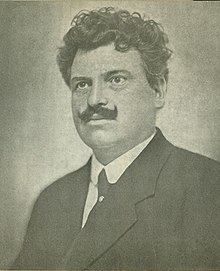
Back Александър Стамболийски Bulgarian Aleksandar Stambolijski Czech Aleksandar Stambolijski German Aleksandr Stambolijski Esperanto Aleksandar Stamboliski Spanish Aleksandǎr Stambolijski Estonian Aleksandar Stamboliyski Basque آلکساندر استامبولیسکی Persian Aleksandăr Stambolijski Finnish Alexandre Stamboliyski French
Aleksandar Stamboliyski | |
|---|---|
 | |
| 20th Prime Minister of Bulgaria | |
| In office 14 October 1919 – 9 June 1923 | |
| Monarch | Boris III |
| Preceded by | Teodor Teodorov |
| Succeeded by | Aleksandar Tsankov |
| Personal details | |
| Born | Aleksandar Stoimenov Stamboliyski 1 March 1879 Slavovitsa, Eastern Rumelia, Ottoman Empire (now Bulgaria) |
| Died | 14 June 1923 (aged 44) Slavovitsa, Bulgaria |
| Manner of death | Assassination |
| Political party | Bulgarian Agrarian National Union |
| Spouse |
Milena Daskalova (m. 1900) |
| Children | Nadezhda Asen |
| Education | University of Munich |
| Signature |  |
Aleksandar Stoimenov Stamboliyski (Bulgarian: Александър Стоименов Стамболийски;[a] 1 March 1879 – 14 June 1923) was a Bulgarian politician who served as the Prime Minister of Bulgaria from 1919 until 1923.
Stamboliyski was a member of the Agrarian Union, an agrarian peasant movement which was not allied to the monarchy, and edited their newspaper. He opposed the country's participation in World War I and its support for the Central Powers. In a famous incident during 1914 Stamboliyski's patriotism was challenged when members of the Bulgarian parliament questioned whether he was Bulgarian or not, to which he shouted in response "At a moment, like the current, when our brothers South Slavs are threatened, I am neither a Bulgarian nor a Serb, I am a South Slav!".[1] This statement relates to his belief in a Balkan Federation which would unite the region and supersede many of the national identities which existed at the time.[citation needed] He was court-martialed and sentenced to life in prison in 1915 due to his opposition to Bulgaria joining the Central Powers in WWI.
In 1918, with the defeat of Bulgaria as an ally of the Central Powers, Tsar Ferdinand abdicated in favor of his son Tsar Boris III who released Stamboliyski from prison. He joined the government in January, 1919, and was appointed prime minister on October 14 of that year. On March 20, 1920, the Agrarian Union won national elections and Stamboliyski was confirmed as prime minister.
During his term in office, Stamboliyski made a concerted effort to improve relations with the rest of Europe. This resulted in Bulgaria becoming the first of the defeated states to join the League of Nations in 1920.[2] Though popular with the peasants, he antagonized the middle class and military. He was ousted in a military coup in June 1923. He attempted to raise a rebellion against the new government, but was captured by the Internal Macedonian Revolutionary Organization, which detested him for renouncing Bulgarian national interest on the region of Macedonia, was brutally tortured, and killed.
Born to a farmer, Aleksandar Stamboliyski spent his childhood in his birth village of Slavovitsa, the same village where he would later gather several thousand insurrectionists from the region and advance against the town of Pazardzhik. However, before this grand counter-insurgence was to transpire, Stamboliyski had to work himself up the ranks of the nation's political scene as the leader of the Bulgarian Agrarian National Union. Although successful in his political ambition of acquiring the highest political office of the state, the unstable political atmosphere of Bulgaria in the early inter-war years ultimately contributed to Stamboliyski's demise.
Cite error: There are <ref group=lower-alpha> tags or {{efn}} templates on this page, but the references will not show without a {{reflist|group=lower-alpha}} template or {{notelist}} template (see the help page).
- ^ Several different versions of this quote exist, but all contain more or less the same meaning but with slightly different wording, presumably from differing translations. M. D. Stragnakovitch, Oeuvre durapprochement et de l'union des Serbes et des Bulgares dans le passé (Paris: éditions et publications contemporaines Pierre Bossuet, 47, rue de la Gaîté, 1930), 26; Cited from Stavrianos, The Balkan federation, 39; also see J. Swire, The Bulgarian Conspiracy (London: R. Hale, 1939), 142.
- ^ R.J. Crampton, The Historical Dictionary of Bulgaria (Oxford, Oxford University Press: 2007), 228.
© MMXXIII Rich X Search. We shall prevail. All rights reserved. Rich X Search